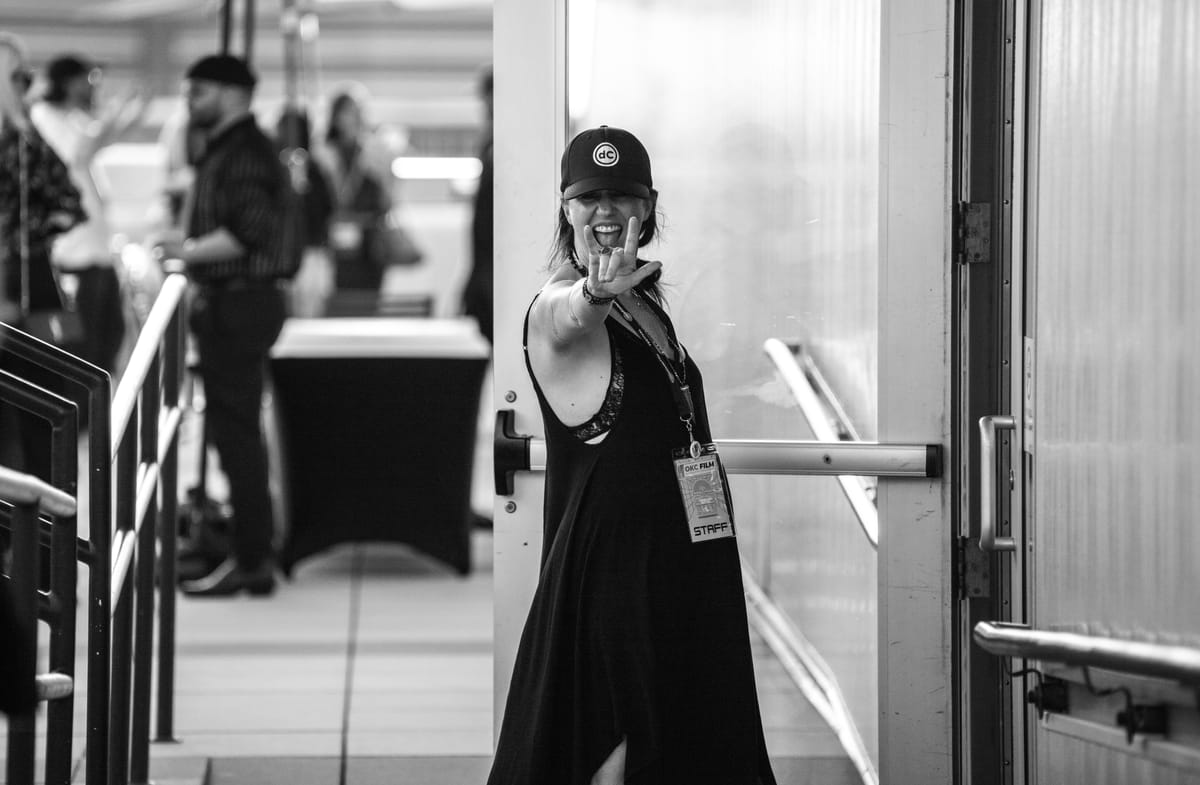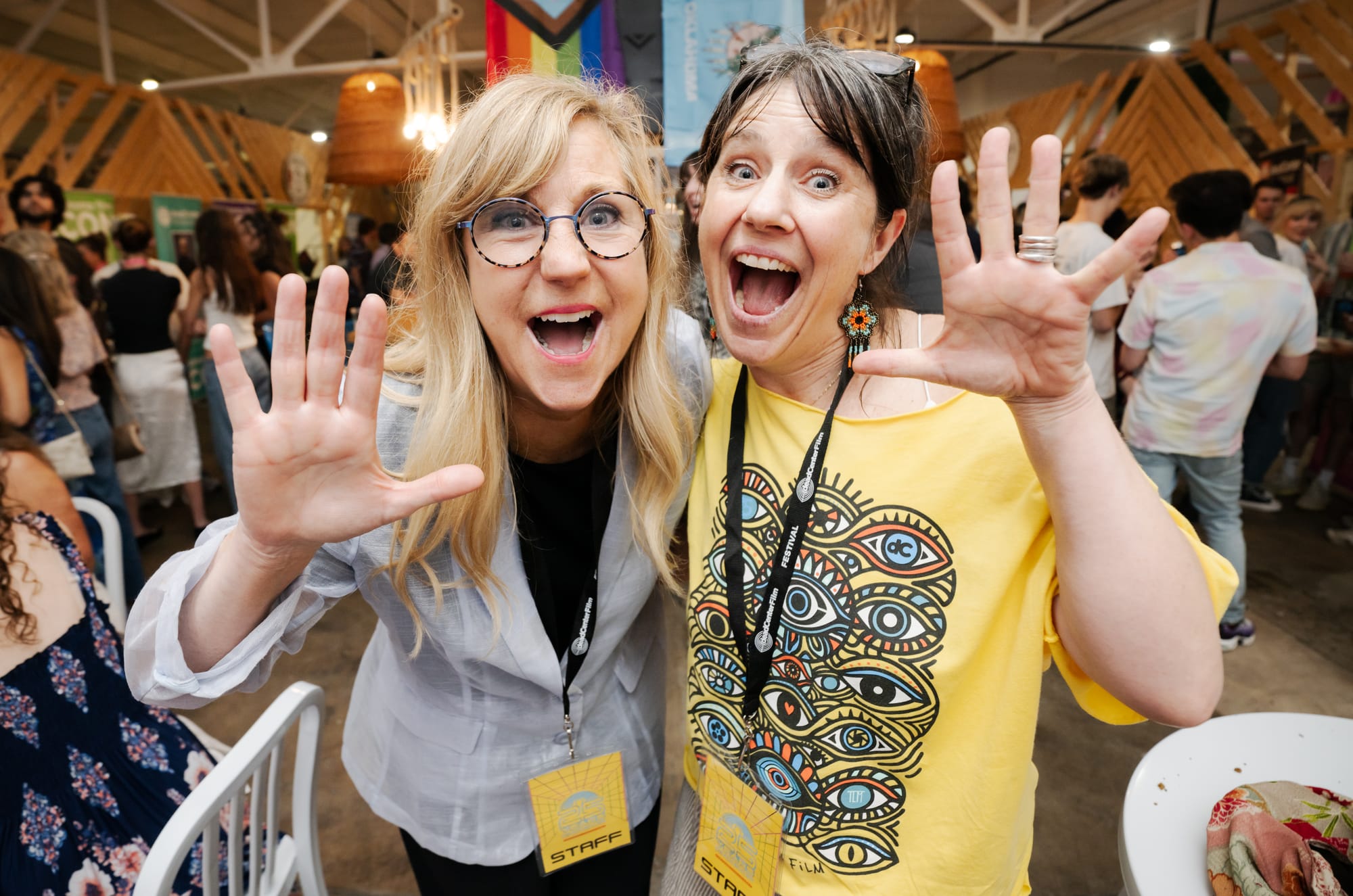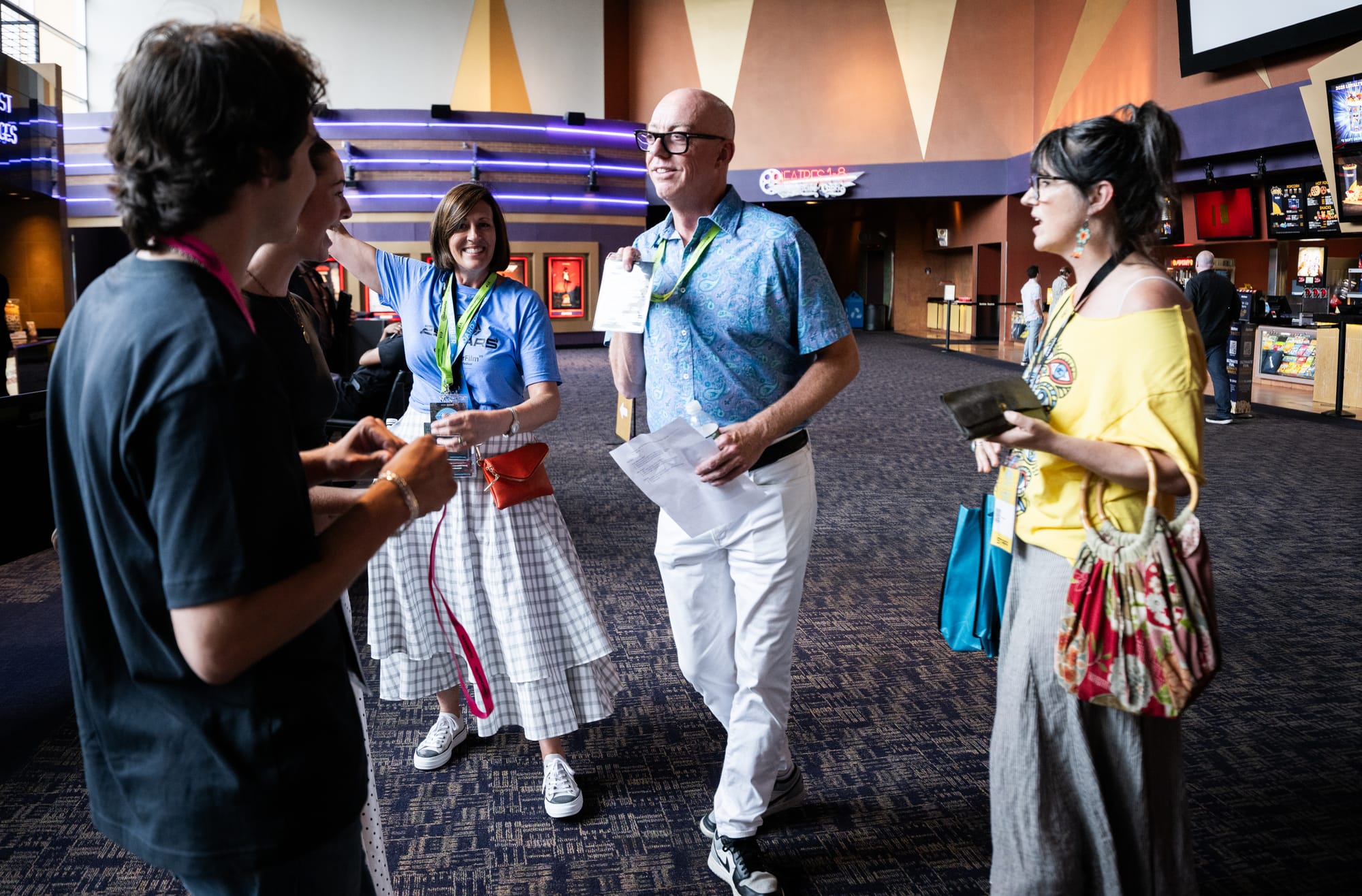
Just halfway through 2025, Oklahoma’s already had a big year. First, Oklahoma City was officially announced as a satellite Olympic site for canoe slalom and softball for LA28. Then, of course, the Thunder finally brought the trophy home.
The energy in the state is palpable, infectious, electric—and not just in the world of sports. Film producer and creative powerhouse Amy Janes, named deadCenter Film Festival’s newest Executive Director during the 25th annual festival in June, knows Oklahoma’s renaissance is just getting started.
“I am beyond excited. I mean, my skin is crawling. I am so excited about what’s happening here,” remarks Janes, wearing this year’s limited edition yellow deadCenter tee. Her enthusiasm is well-warranted: Attendance at the 2025 fest is up significantly for both day- and night-time programming and film viewership.
The success of the latest deadCenter installment is just a microcosm of what Janes, a 30-year vet of the film industry, sees as all the signs of an independent film revolution. And she believes Oklahoma is charging ahead to take center stage.
“I mean, you’ve seen it,” says Janes. “It’s our turn. It’s 100% our turn.”
Big Bets
Early in her life, filmmaking grabbed Janes and never let go. After facing financial turmoil and failing out of three different college majors, she decided to bet on herself; changing her major to film studies and transferring to the University of Colorado at Boulder. After college, Janes worked at a small production studio editing documentaries for PBS, which eventually led her to pursue and receive her MFA in the Producer’s Program at UCLA.
Her two decades in Los Angeles were storied—she served as vice president of film production at Paramount-based Parkchester Pictures, consulted on major documentaries and founded her own media agency, Fanology, which developed groundbreaking work for “Pretty Little Liars” and Toyota’s Olympic campaigns.
Despite her overwhelming success, there was one problem: Janes loathed L.A.
“I made websites sitting on my back porch in L.A., crying because I f***ing hated L.A., trying to dream about how we could have our own studio and be able to support people,” says Janes.
So, making another life-changing big bet, she and her family—within three months of visiting Oklahoma for the first time—packed up their lives and moved to the state in 2018. Quickly, Janes got to work in investing in her new film community and eventually co-founding the Filmmaker’s Ranch, Oklahoma’s first Hollywood-grade soundstage. Another pastime during her time here so far? Relocating L.A. filmmakers and artists.
“Collectively, my husband and I, in the seven years we’ve been here, probably moved 35 people out of L.A., families and individuals. We don’t have to say anything; they just come, and they recognize what’s possible,” says Janes.
The switch isn’t a hard sell. Among many factors, filmmakers and crew are flocking from L.A. due to the inability to get regular work there, with the cyclical boom and bust of the studio system to blame.

Film School
Rewind to the 1970s. The bottom has fallen out of the studio system in Hollywood; executives are left scratching their heads at the taste of the average American moviegoer; film’s Classical Age is officially over. Due to the lack of studio backing, independent filmmakers (some of whom eventually became part of the New Hollywood movement) are cultivating their voices, making waves and becoming the auteurs now studied in film school classrooms.
Fast forward to the 1990s. Janes was at the start of her career, and the independent voice at film festivals across the country was strong. In this time period, an indie film with a prominent festival play could potentially entertain widespread distribution. For instance, Kevin Smith’s cult classic Clerks famously played Sundance and was picked up by Miramax for a theatrical run.
But this era didn’t last.
“If you study the history of film, we are a very cyclical industry. So it goes from studios to independent, independent to studios,” says Janes. “So what happened during the last era of studio control, most of our film festivals had to change their models to stay alive.”
Janes explains that festivals like Sundance had to shift their model by premiering films that already had big budgets, secured distribution and massive stars, just to keep themselves financially solvent. A far cry from premiering a film like Clerks, which was shot for $27K and had no big names attached.
“We are coming out of the most—how do I say it nicely?—we’re coming out of a very strong studio era. That has really taken a toll on a lot of smaller and independent filmmakers, because there is really no distribution for them,” says Janes. “We were looking at all the little streamers, who would be picking up those films. Well, that era has also gone.
“So we are now moving back to what I believe will very seriously be the 1970s era of filmmaking. Some of the best, most incredible voices will be coming out of independent filmmaking, and the studios won’t have the cash to fund their own $200 million [film], so they’ll be looking back to the markets, which are the film festivals.”
It’s Janes’ thesis that deadCenter can become the next steward of indie filmmaking, becoming a prime market for film distributors—a movement she is uniquely positioned to shepherd.
Tapping her decades of industry know-how and a contact list of extensive connections, Janes has a vision of what she wants deadCenter to be; think Sundance, with Keri Putnam (serendipitously Janes’ mentor) at the helm. Could the next Clerks be sold due to screening at deadCenter?
“If we can become a strong business, we have an opportunity to not only re-label how people view Oklahoma through a more artistic and independent voice, but also we have an opportunity to get our filmmakers sold, get our filmmakers seen and have the world look to Oklahoma,” says Janes.

‘Anything Is Possible’
Since the festival was founded in 2000 by brothers Justan and Jayson Floyd, each executive director has made their unique mark on the festival. Former deadCenter Executive Director Cacky Poarch and deadCenter co-founder Justan Floyd, along with Melissa Scaramucci, Brian Hearn and Geoffrey L. Smith, relocated the festival to downtown OKC, where it has been held annually for most of the past two decades. Every year, each executive director and festival team worked tirelessly to get the screened films, many from Oklahoma, their due.
Janes says that deadCenter has been repeatedly told the festival leadership has cultivated “the best volunteers” and hopes to build on that base as the festival grows, especially into LA28, when deadCenter will participate in the cultural Olympiad. Even outside the annual festival and the upcoming Olympics, Janes wants there to be year-round opportunities to get involved and experience film in a way that’s uniquely Oklahoman.
“The vision is to really keep building on the platform that all of the EDs before me have [built],” says Janes. “Again, I’ve only been here seven years, and I know the amount of work that people have put into making the city phenomenal, to making Tulsa phenomenal. So I can’t take any credit for that.”
Before she moved to the state, Janes shared a moment with a former deadCenter executive director that changed the trajectory of her life for good.
“Lance McDaniel was the very, very first person I met. And he looked at me and I said, ‘Why are you here?’ like this beautiful, vibrant man, like he could be anywhere in the world,” remembers Janes. “He looked at me and he goes, ‘Amy, anything’s possible in this city.’”
Now we’re in the process of seeing just how right they are. •
Learn how to get involved with deadCenter Film Festival by visiting deadcenterfilm.org, or follow the festival on Instagram at @deadcenterfilm.

